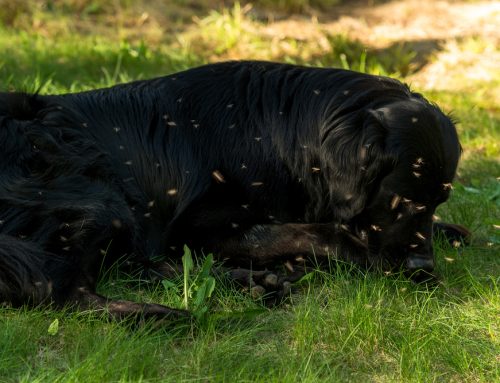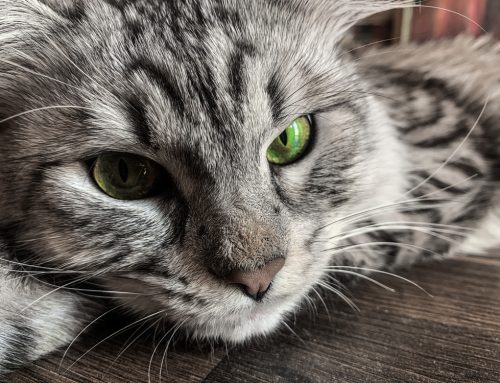Holiday Hazards
Holidays bring together family and friends to celebrate a joyous occasion. As we begin unpacking decorations and finding grandma’s famous turkey stuffing recipe there are a few tips we need to remember to keep our furry four-legged family members safe.
Keep all candy out of reach of sniffing noses. Chocolate is the most common candy seen during the holidays. It contains theobromine, which in excessive amount can cause nerve damage and even death. Symptoms of chocolate toxicity may include excessive drooling or urination, pupil dilation, vomiting and/or diarrhea. Candy wrappers also poise a threat by causing intestinal obstruction or choking. A newer hazard is a certain type of sugar-free gum containing xylitol. This substance mimics natural sugar and can lead to coma and even death if pets are allowed access to it.
One of the biggest hazards during Thanksgiving would of course be the turkey and all the fixings. Every dog needs a bone right? WRONG! Avoid giving all types of turkey bones to your pet. Even the smallest bones could potentially lodge in your pet’s throat or intestines. When making those thanksgiving buns, remember bread dough is extremely dangerous for any pet. Since bread dough raises it can cause extreme abdominal pain, bloat, vomiting and disorientation. If a large amount is consumed your pet may require surgery to retrieve the dough and may need treatment for alcohol toxicosis due to fermentation of the dough.
Do not give your pets any food high in fat or salt such as ham or bacon. These types of foods can lead to stomach issues and/or pancreatitis. Onions and onions powder can damage red blood cells, which can cause anemia. Raisins and grapes can lead to kidney failure, so if your not sure of ingredients in your stuffing, potatoes or yams avoid giving it to your pets. The best thing is to keep your pets on their scheduled diet to keep them safe. Never leave food unattended on table or counter at any time. Doing this will avoid a disastrous ending to a wonderful holiday meal.
Christmas is a holiday we all enjoy but it also brings with it many hazards for our fuzzy friends. As we count down the days please remember these safety tips. If you are one to enjoy a live tree always keep the tree stand covered. The pinesap in the water can make your pet sick.
Stagnant tree water can have an alarmingly high bacterial content, which can cause vomiting, nausea, and diarrhea. Always avoid edible ornaments on your tree. This is just a temptation that any animal even humans can’t avoid. Some other toxic plants to be aware of during this holiday, is the poinsettia. These can cause oral and stomach irritation with mild vomiting or nausea. Mistletoe can cause toxicity to your pet’s heart, but more commonly causes gastrointestinal upset. Holly, if ingested, can also cause gastrointestinal upset along with lethargy. Tree ornaments and decorations are very beautiful during the Christmas season but can cause some pets misery if ingested. If there is a mishap in your household with ornaments here is a method to aid your pet. Keep on hand before any holiday season, a box of cotton balls and a quart of half-and-half, which you can freeze for later use. If your pet should happen to enjoy a twinkling treat, thaw the cream and put in bowl dip cotton balls in cream and feed to your pet. Dogs under 10# should eat 2 balls torn into smaller pieces. Dogs 10-30# should eat 3-5 balls and larger dogs can eat 5-7 balls. As the cotton work its way through the digestive tract it will find all the glass pieces and wrap itself around them. This will protect your pet’s intestines from damage. Your dogs stool will be quite strange as the cotton passes. Some problems to watch for are fresh blood in stools or around rectum and a tarry appearance to the stool. If this should happen please seek veterinary assistance.
 Along with dogs cats also enjoy the holiday season. Cats love pretty and shiny things. Try to keep cats out of tinsel this is probably easier said then done! Tinsel can turn into a nasty foreign body in the gut. It can entangle itself in your cat’s intestines, which almost always requires surgery to retrieve.
Along with dogs cats also enjoy the holiday season. Cats love pretty and shiny things. Try to keep cats out of tinsel this is probably easier said then done! Tinsel can turn into a nasty foreign body in the gut. It can entangle itself in your cat’s intestines, which almost always requires surgery to retrieve.
Remember to cover or hid electrical wires, your pet could chew them and it could electrocute them. We would also like to remind you of a couple other winter hazards. Antifreeze has a pleasant sweet taste, which pets never hesitate to try a lick. As small as a teaspoon of antifreeze can be deadly. Always clean up any antifreeze spills and store extra in a tightly sealed container. If you think your pet has ingested antifreeze seek veterinary help immediately.
Rock salt used to melt ice can be irritating to your dog’s feet. When walking in the winter months check your pet’s feet often, wash and dry when you arrive home to avoid any injury.
Here are some other food items that should be avoided during any season. Alcoholic beverages can cause intoxication, coma and even death. Baby food can contain onion powder, which we learned during the Thanksgiving holiday can cause harm. Coffee, tea, or other caffeine can affect heart and nervous system. Citrus oil extracts can cause vomiting. Human vitamin supplements containing iron can damage the lining of the digestive tract and can be toxic to liver and kidneys. Liver in large amounts can cause vitamin A toxicity, which affects muscles and bones. Macadamia nuts can affect digestive and nervous systems and can cause seizures.
We at Billings Animal Family Hospital hope you and your pets have a wonderful and safe holiday season!







Leave A Comment